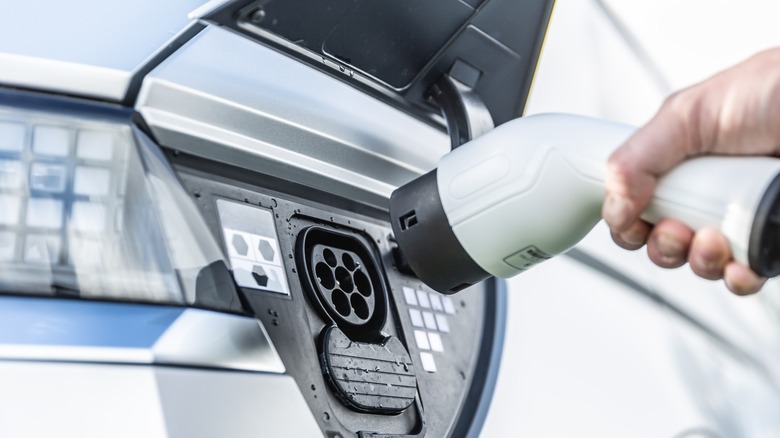Here's Why Electric Cars Are Getting Even More Expensive
More and more people are looking to get into the EV marketplace. Electric vehicles are growing in popularity in the United States, and for good reason. Ford, Toyota, and other prominent names in the American marketplace have all committed to a substantial ramping up of resources poured into EV research and development projects; and the U.S. government is working toward this change as well, according to The Guardian. In the coming decades, just about every major manufacturer appears to be committed to entirely eliminating their production of new-model gasoline and diesel-powered vehicles in favor of a transition to entirely electric fleets.
This shift has been heralded as a major win in the fight against climate change, but the productive focus isn't the only necessity when it comes to a full EV transition. EVs have become far more expensive in the last year, and for a bevy of reasons. The harsh reality is that if electric vehicles continue to rise in price as manufacturers phase out competitive alternatives, consumers will simply shift en masse to the purchase of used and likely gasoline-powered automobiles. This of course would defeat the purpose of a market-wide shift to electric vehicle production.
Fortunately, a change in the pricing structure for electric vehicles appears to be tied to ongoing geopolitical issues rather than intangible and interlocking features of the electric vehicle marketplace itself. As a result, it's entirely possible that the spike in EV retail prices will be short-lived and change alongside other global trends.
The battery
The most important component of an electric vehicle is its battery, which makes up a significant portion of the total cost of the vehicle. Changes in the price to manufacture or otherwise procure batteries for EVs can severely impact the cost of the vehicles themselves. There are a number of facets that play a role in battery pricing, and most of them revolve around geopolitical concerns. For one thing, EV batteries rely on lithium, nickel, and other rare earth metals. Russia supplies roughly 20% of the world's nickel for use in all kinds of batteries (via The Wall Street Journal). With the ongoing war in Ukraine continuing to isolate the Russian government, society, and marketplace from the rest of the world, the availability of nickel for use in the fabrication of new EV batteries is strained to say the least.
Now, the Chinese manufacturing sector is responsible for contributing about 80% of global lithium-ion battery production, according to Visual Capitalist, with that percentage expected to decline. A trade war constructed by the previous administration has forced American car manufacturers to source batteries elsewhere, with many working to launch production of this essential resource in the United States rather than abroad. These stresses on the supply chain are a common theme for virtually all fabricated products that consumers rely on, but in the case of EVs, the product in question lies at the heart of the finished output.
Electricity pricing and tax credits
Another important feature in both the initial cost and ongoing operational pricing of a vehicle lies beyond manufacturing.
On the front end, tax credits for new electric vehicle purchases are diminishing (per Slate). This means that new car buyers are seeing less support financially from the government than early adopters did. On a direct level, this increases the price tag of an EV right from the starting block. Tax credits can't last forever, but a change here will certainly produce ripple effects down the line. For more on current EV tax credits, see FuelEconomy.gov.
In addition to the upfront buying price, changes in the economy affect EV sales and use in other nuanced ways. For one thing, with a deepening economic crisis ongoing around the world, financing a new vehicle purchase of any kind has become more expensive as interest rates have risen (via Bankrate). In addition to the increased repayment burden, consumers are spending more on electricity, according to the U.S. Energy Information Administration. The hallmark of an electric vehicle is its ability to charge rather than rely on fossil fuels to power its engine. But if the resource required to charge your vehicle costs more today than it did last year, then ownership itself costs more as well.


